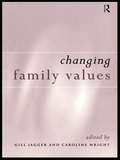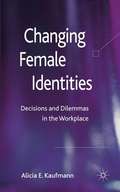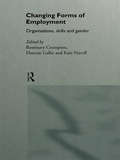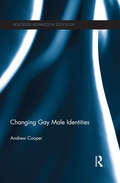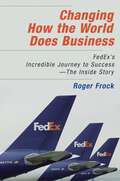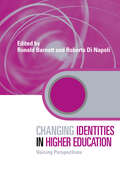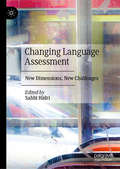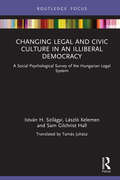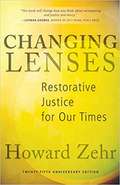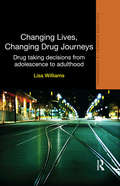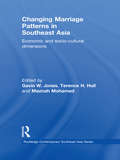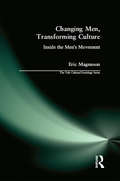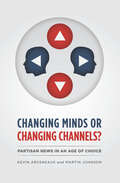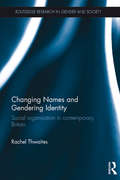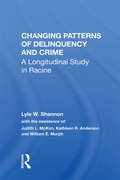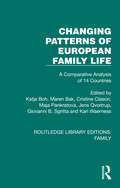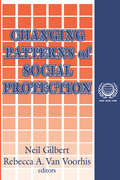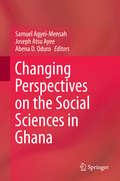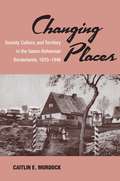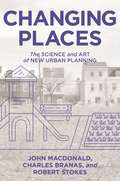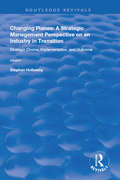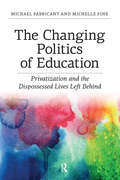- Table View
- List View
Changing Family Values: Difference, Diversity and the Decline of Male Order
by Caroline Wright Gill JaggerChanging Family Values offers a comprehensive introduction to contemporary debates and new research surrounding the family. It explores how we define traditional family values and how these values are perceived as being underthreat in contemporary society. Ranging across politics, social policy, law and sociology, the contributors focus on the diverse realities of contemporary family life. Issues covered include:* the recent backlash against single mothers* lesbian and gay families and the law* men's changing roles within the family* the future of the nuclear family.This book is ideal for courses covering the family, a central topic in sociology and women's studies.
Changing Female Identities
by Alicia E. KaufmannChanging Female Identities explores the influence of parental figures, the role models that women adopt, the diverse feelings that arise as a result of family mandates and the emotions that arise from cooperation or competition among siblings.
Changing Forest
by Dennis PotterDennis Potter was born and brought up in the Forest of Dean- a 'strange and beautiful place', as he described it in the last interview before his death, 'rather ugly villages in beautiful landscape, a heart- shaped place between two rivers, somehow slightly cut off from the rest of England... with a people as warm as anywhere else, but they seemed warmer to me.' It was a childhood which informed all his television work, from his first documentary to such classic dramas as The Singing Detective.The Changing Forest, first published in 1962, is Potter's deeply personal study of that small area- its people, traditions, ceremonies and institutions- at a time of profound cultural and social change in the late 1950s and early '60s. With extraordinary precision and feeling he describes the fabric of a world whose old ways are yielding to the new: habits altering; expectations growing; work, leisure, language itself changing under the impact of the new television, of commercial jingles and the early Elvis. And, with powerful sympathy and wit, he asks whether the gains of modernity have, for the individuals and society he so marvellously evokes, been worth the loss.Part autobiography of one of this century's greatest writers, part elegy for a vanishing way of life, part testament to the abiding humanity that underlies all Potter's work, this exquisite, passionate and brillinat book is a classic of its kind.
Changing Forms of Employment: Organizations, Skills and Gender
by Rosemary Crompton Duncan Gallie Kate PurcellDuring the last two decades there has been widespread evidence of change in specific aspects of employing organizations, employment and employment related institutions. Changing Forms of Employment looks at the underlying trends which generate pressures towards a fundamental reshaping of social institutions in three ways: changes in the organization of production, particularly those associated with the growth of service dominated economics; the effects of technological change, particularly those associated with Information Technology; the erosion of the 'male breadwinner' (or single earner) model of employment and household. These trends have resulted in strains and ruptures in the organization and regulation of employment, and related institutions including trade unions, employers, and households. The task of the next decade is to both reconstruct relationships, and to renew institutions.
Changing Gay Male Identities (Routledge Advances in Sociology)
by Andrew J. CooperAs the world changes, so sexual identities are changing. In a context of globalisation, mass communication and technological advances, individuals find themselves able to make lifestyle choices in new and different ways. In this increasingly confusing world, sociologists have argued that identities are in flux, and that traditional patterns of identity and intimacy are being disrupted and reshaped, with all the implications for sexual identities that this suggests. Changing Gay Male Identities draws on the powerful life stories of twenty-one gay men to explore how individuals construct and maintain their sense of self in contemporary society. The book draws upon theoretical debates on topics such as gender, performance, sex, class, camp, race and ethnicity, to explore four aspects of identity: the role of the body in who we are relationships and communities performing in everyday life reconciling different aspects of our selves (such as religion and sexuality). In Changing Gay Male Identities Andrew Cooper assesses the magnitude of these social and sexual changes. He argues that although there are many opportunities for new forms of identity in a changing world, the possibilities can be significantly constrained, and that this has major implications for the freedoms and choices of individuals in contemporary societies. This book will be of interest to students and scholars of sociology, sexuality studies, gender studies, and GLBTQ studies.
Changing How the World Does Business: Fedex's Incredible Journey to Success - The Inside Story
by Roger FrockFrom humble beginnings, FedEx has literally revolutionized the way business is conducted. Not too long ago, overnight shipping was barely an option for even the largest companies. Today, thanks to FedEx, it's available to every living room start-up. With annual revenues of $30 billion, more than 250,000 employees, 600 aircraft, and 70,000 surface vehicles, FedEx handles nearly six million shipments a day in two hundred countries. FedEx has become a household name, and has been named one of the top ten of America's Most Admired Companies by Fortune magazine. But it wasn't always easy. From his inside vantage point as the company's first general manager and chief operating officer, Roger Frock reveals the remarkable details of how Fred Smith and his team endured their tumultuous early years--fraught with a seemingly unending series of legal, financial, and operational crises that continually threatened the company's ability to stay in business--and, in the end, created an entirely new industry. Frock chronicles the dramatic last-minute saves and turnarounds the company engineered from its inception to the present. He entertains with stories of the trials and tribulations of the company's early struggles and victories--from Pilots using personal credit cards to fuel planes, to the courier who hocked his watch to put gas in his delivery van, and, one of the most memorable episodes, the time that founder Fred Smith literally gambled the company's last remaining funds to keep the planes flying. Frock's story introduces all the players--FedEx's resourceful and resilient leaders and employees--and shows how these remarkable individuals gave Fred Smith's original concept wings and, through flexibility, creativity, and commitment, made a fledgling startup into one of the great success stories in modern business. Changing How the World Does Business is an inspirational tale for leaders and entrepreneurs everywhere.
Changing Identities in Higher Education: Voicing Perspectives (Key Issues in Higher Education)
by Ronald Barnett Roberto Di NapoliIn this timely and innovative book scholars from Europe, the UK, North America and Australia, explore their own sense of identity, reflecting both on their research and scholarly interests, and their work experiences. Taking the form of a debate, Changing Identities in Higher Education helps to widen the contemporary space for debates on the future of higher education itself. The book is split into three parts: part one presents a set of essays each on a set of identities within higher education (academic, student, administrative/managerial and educational developers). part two includes responses to Part one from authors speaking from their own professional and scholarly identity perspective part three illustrates perspectives on the identities of students, provided by students themselves. With its original, dialogic form and varied content, this book is of interest to all those concerned in current debates about the state and nature of higher education today and those interested in questions of identity. It makes especially useful reading for students of higher education, lecturers in training, academics and managers alike.
Changing Japanese Attitudes Toward Modernization
by Robert N. Bellah Marius B. Jansen Albert Craig Shuichi Kato R. P. Dore S. Masao Maruyama Roger F. Hackett Herbert Passin John Whitney Hall Donald H. Shively Stephen N. Hay Herschel Webb John F. Howes Hellmut WilhelmA collection of scholarly essays on Japanese attitudes towards modernization from Tokugawa to the present, with an emphasis on intellectuals, philosophers, and writers.
Changing Language Assessment: New Dimensions, New Challenges
by Sahbi HidriThis edited book brings together fifteen original empirical studies from a variety of international contexts to provide a detailed exploration of language assessment, testing and evaluation. Language assessment has a key role in the development and implementation of language and educational policies at the national level, and this book examines some of the impacts - both positive and negative - of different skills testing and examination approaches on learning outcomes and individual students' language learning. This book will be of interest to scholars working in applied linguistics and language education, teacher training, testing and evaluation, as well as stakeholders such as practitioners, educators, educational agencies, and test developers.
Changing Legal and Civic Culture in an Illiberal Democracy: A Social Psychological Survey of the Hungarian Legal System
by István H. Szilágyi László Kelemen Sam Gilchrist HallChanging Legal and Civic Culture in an Illiberal Democracy is a unique empirical study on recent developments in legal and civic consciousness in Hungary. Drawing its methodology from social psychology, this book illuminates a shift in legal consciousness during the time in which Orbán’s government has cemented Hungary’s reputation as an illiberal democracy. The book foregrounds the voices of the Hungarian population in how they view the shift towards increasingly right-wing politics and an erosion of the rule of law. It opens with an extensive theoretical introduction of the historical development and psychological dimensions of legal consciousness in Hungary and relates the Hungarian research to international developments. It then presents its empirical results and offers a jargon-free account of ordinary people’s changing perceptions of their relationship to Hungary’s civic and legal cultures, before finally examining the correlations between surveys. Methodologically, the book establishes that theories of legal consciousness and social change are bolstered by empirical data. Offering a new way of approaching shifts in legal consciousness and the rule of law in Balkan and Eastern European countries, this text will be of great interest to researchers and students of social psychology, law, international relations and Central European studies.
Changing Lenses: Restorative Justice for Our Times
by Howard ZehrDoes the criminal justice system actually help victims and offenders? What does justice look like for those who have been harmed? For those who have done harm? Twenty-five years after it was first published, Changing Lenses by Howard Zehr remains the classic text of the restorative justice field. <P><P> Now with valuable author updates on the changing landscape of restorative justice and a new section of resources for practitioners and teachers, Changing Lenses offers a framework for understanding crime, injury, accountability, and healing from a restorative perspective. Uncovering widespread assumptions about crime, the courts, retributive justice, and the legal process, Changing Lenses offers provocative new paradigms and proven alternatives for public policy and judicial reform.
Changing Lives, Changing Drug Journeys: Drug Taking Decisions from Adolescence to Adulthood (Routledge Advances in Ethnography)
by Lisa WilliamsThis book describes how a group of young people make decisions about drug taking. It charts the decision making process of recreational drug takers and non-drug takers as they mature from adolescence into young adulthood. With a focus upon their perceptions of different drugs, it situates their decision making within the context of their everyday lives. Changing lives, changing drug journeys presents qualitative longitudinal data collected from interviewees at age 17, 22 and 28 and tracks the onset of drug journeys, their persistence, change and desistance. The drug journeys and the decision making process which underpins them are analysed by drawing upon contemporary discourses of risk and life course criminology. In doing so, a new theoretical framework is developed to help us understand drug taking decision making in contemporary society. This framework highlights the pleasures and risks that interviewees perceive when making decisions whether or not to take drugs. The ways in which their drug journeys and life journeys intersect and how social relationships and transitions to adulthood facilitate or constrain the decision making process are also explored. Qualitative longitudinal research of this kind is uncommon yet it provides an invaluable insight into the decision making process of individuals during the life course. The book will, therefore, be of interest to researchers and students from a variety of disciplines including qualitative research methods as well as sociology, criminology, cultural and health studies. It will also be an important resource for professionals working in health promotion, drugs education, harm reduction and treatment.
Changing Marriage Patterns in Southeast Asia: Economic and Socio-Cultural Dimensions (Routledge Contemporary Southeast Asia Series)
by Gavin W. Jones Maznah Mohamad Terence H. HullVarious forms of partnering – such as officially registered marriages, cohabiting relationships, and other kinds of relatively stable relationships - are crucial in the formation of families throughout the world. Although, today, forms of partnering in the region are not restricted to formal marriage, the norm remains for couples to marry – to establish a new family, and to accept the cultural requirement to have children. This book provides a comprehensive and up-to-date picture of partnerships and marriage in the Southeast Asian region using quantitative data alongside qualitative approaches.Through the research of demographers, sociologists and anthropologists, it examines the way trends in the formation and dissolution of marriages are related to changes in the region’s economy and society; illuminating both the broad forces affecting marriage patterns and the way these forces work out at the individual and family level. Presenting the variety of contemporary marriage patterns in the region, with an emphasis on the ways in which marriage issues impinge on the welfare of those concerned, this book will be essential reading for students and scholars of Southeast Asia and the sociology of the family.
Changing Men, Transforming Culture: Inside the Men's Movement
by Eric MagnusonThe men's movement is a fascinating and vexing phenomenon that is part of the important history of gender change in the United States and the world. Men are finally engaging the challenges of feminism and rethinking what it means to be a man in today's society. At stake in this "crisis of masculinity" is the future of the family, the economy, and the society as a whole. This book examines the cultural imagery and the actions of the men of the mythopoetic men's movement in particular, examining their ideas, goals, and behavior. The book innovates theoretically by synthesizing cultural sociology with an interest in power as well as social psychology. Using ethnography as its primary research method, the study explores hegemony and microlevel power on the interactional level. The result is a dynamic look at the social construction of cultural discourse and the action that follows in this curious and unusual social movement.
Changing Minds or Changing Channels?: Partisan News in an Age of Choice (Chicago Studies in American Politics)
by Martin Johnson Kevin ArceneauxWe live in an age of media saturation, where with a few clicks of the remote—or mouse—we can tune in to programming where the facts fit our ideological predispositions. But what are the political consequences of this vast landscape of media choice? Partisan news has been roundly castigated for reinforcing prior beliefs and contributing to the highly polarized political environment we have today, but there is little evidence to support this claim, and much of what we know about the impact of news media come from studies that were conducted at a time when viewers chose from among six channels rather than scores.Through a series of innovative experiments, Kevin Arceneaux and Martin Johnson show that such criticism is unfounded. Americans who watch cable news are already polarized, and their exposure to partisan programming of their choice has little influence on their political positions. In fact, the opposite is true: viewers become more polarized when forced to watch programming that opposes their beliefs. A much more troubling consequence of the ever-expanding media environment, the authors show, is that it has allowed people to tune out the news: the four top-rated partisan news programs draw a mere three percent of the total number of people watching television.Overturning much of the conventional wisdom, Changing Minds or Changing Channels? demonstrate that the strong effects of media exposure found in past research are simply not applicable in today’s more saturated media landscape.
Changing Names and Gendering Identity: Social Organisation in Contemporary Britain (Routledge Research in Gender and Society)
by Rachel ThwaitesThis book investigates contemporary naming practices on marriage in Britain, drawing on survey data and detailed interview material in which women offer their own accounts of the reasons for which they have changed or retained their names. Exploring the ways in which names are used to create and understand family, to cement commitments and make it clear to the self and to others that subject is in ’true love’, Changing Names and Gendering Identity considers the manner in which names are used to make sense of the self and narrate life changes and choices in a coherent fashion. A critique of the gender-blindness of sociological theories of individualisation, this volume offers evidence of the continued importance of traditions and the past to the functioning of contemporary society. In dissecting the everyday, taken-for-granted ritual of name changing for women on marriage, it sheds light on the nature of an enduring set of unequal gender relations which are used to organise society, behaviour and interpersonal relations. Engaging with questions of power, heteronormativity, and gender relations, this analysis of a significant ritual of contemporary heterosexual marriage will interest sociologists and scholars of gender studies with interests in the family, identity and gender relations.
Changing Patterns Of Delinquency And Crime: A Longitudinal Study In Racine
by Lyle W. ShannonThe result of a 30-year longitudinal study in Racine, Wisconsin, this monograph tracks the criminal behaviour of juveniles and the persistence or decline of that behaviour into adult life. The author investigates the influence of the neighbourhood environment on the development of a criminal career and the utility of a criminal typology for the pur
Changing Patterns of European Family Life: A Comparative Analysis of 14 Countries (Routledge Library Editions: Family)
by Katja BohOriginally published in 1989, this cross-national study investigates the role and pattern of family life in fourteen countries in contemporary Europe. Providing a wealth of information on European families, it is a key source for anyone wishing to understand the changes in the family at that time. The contributors argue that, far from withering away, the family remained a very important social unit which continued to have considerable influence on other social institutions such as the state and the labour market. The central theme is the interrelation between changes in production and working life on one hand, and changes in family life and reproduction on the other. The contributors focus on the pressures and contradictions produced by the division of functions between family and work, and on problems which have arisen as a consequence of the sometimes incompatible and even conflicting demands of the two institutions. They show that the evolution of the nuclear family model in Europe had led to a great diversity of family patterns, and conclude that the family in modern European societies still had a contribution to make which no other institution could provide.
Changing Patterns of Social Protection
by Gaurav Sharma""A thoughtful assessment of socioeconomic needs and influences, observing the necessity for benefits as well as the lessons of experience offered by various nations""--Library Bookwatch Over the last two decades, aging populations, changing family structures, market forces of globalization, strains of immigration, and political and ideological realignments have joined to create powerful pressures that are reshaping the design and philosophy of social welfare policies. Changing Patterns of Social Protection analyzes emerging patterns of social welfare and the implications of these trends for the future of social protection to vulnerable groups in France, Germany, Italy, The Netherlands, New Zealand, Sweden, United Kingdom, and the United States. Examining central policy trends in these countries, contributors explore current reforms of mainline programs: old age pensions, disability and unemployment insurance, family assistance, health care, and social services. The findings highlight how modern dynamics of social protection are manifest through reforms that include diverse social and economic incentives, changing benefit structures, a wide range of work-oriented measures, the resurgence of private activity, and current approaches to targeting benefits. Assessments of the socioeconomic influences that have precipitated these reforms reveal a broad range of common factors as well as country-specific influences such as the clientelistic approach to welfare in Italy, the complexities of reunification in Germany, and the ""Dutch disease"" of explosive claims for disability benefits. Changing Patterns of Social Protection offers insights into the issues raised by these policy reforms and their possible effects. By clarifying alternative policy designs this work affords a fresh perspective on how to think about the changing structure and function of social welfare arrangements in modern society. Neil Gilbert is Chernin Professor of Social Services and Social Welfare at the Un
Changing Perspectives on the Social Sciences in Ghana
by Samuel Agyei-Mensah Joseph Atsu Ayee Abena D. OduroThis book is the first compilation of its kind that brings together discussions of the evolution of scholarship in different branches of the Social Sciences. It presents a comprehensive multi-disciplinary text exploring the changing dynamics of the Social Sciences in Ghana, offering a broader perspective from which to view the evolution, theory, methods, substance and relevance of each of the Social Science disciplines and their multiple interfaces. The introduction and the conclusion are devoted to the theoretical, comparative and empirical debate over the Social Sciences from historical and analytical perspectives. Written by acknowledged experts, the 15 chapters span the following disciplines: Archaeology and Heritage Studies; History; Geography; Psychology; Sociology and Anthropology; Social Work; Economics; Political Science; International Affairs; Information Studies; Communication Studies; African Studies; Development Studies; Women's and Gender Studies and Adult and Continuing Education. Changing Perspectives on the Social Sciences in Ghana offers sophisticated perspectives for comparing and appreciating the synergies, differences, trends and nuances among and between the Social Science disciplines in Ghana, in a holistic and scholarly manner.
Changing Places
by Caitlin E. MurdockChanging Places is a transnational history of the birth, life, and death of a modern borderland and of frontier peoples' changing relationships to nations, states, and territorial belonging. The cross-border region between Germany and Habsburg Austria---and after 1918 between Germany and Czechoslovakia---became an international showcase for modern state building, nationalist agitation, and local pragmatism after World War I, in the 1930s, and again after 1945. Caitlin Murdock uses wide-ranging archival and published sources from Germany and the Czech Republic to tell a truly transnational story of how state, regional, and local historical actors created, and eventually destroyed, a cross-border region. Changing Places demonstrates the persistence of national fluidity, ambiguity, and ambivalence in Germany long after unification and even under fascism. It shows how the 1938 Nazi annexation of the Czechoslovak "Sudetenland" became imaginable to local actors and political leaders alike. At the same time, it illustrates that the Czech-German nationalist conflict and Hitler's Anschluss are only a small part of the larger, more complex borderland story that continues to shape local identities and international politics today.
Changing Places: The Science and Art of New Urban Planning (Global Academic Publishing Ser.)
by John MacDonald Charles Branas Robert StokesHow the science of urban planning can make our cities healthier, safer, and more livableThe design of every aspect of the urban landscape—from streets and sidewalks to green spaces, mass transit, and housing—fundamentally influences the health and safety of the communities who live there. It can affect people's stress levels and determine whether they walk or drive, the quality of the air they breathe, and how free they are from crime. Changing Places provides a compelling look at the new science and art of urban planning, showing how scientists, planners, and citizens can work together to reshape city life in measurably positive ways.Drawing on the latest research in city planning, economics, criminology, public health, and other fields, Changing Places demonstrates how well-designed changes to place can significantly improve the well-being of large groups of people. The book argues that there is a disconnect between those who implement place-based changes, such as planners and developers, and the urban scientists who are now able to rigorously evaluate these changes through testing and experimentation. This compelling book covers a broad range of structural interventions, such as building and housing, land and open space, transportation and street environments, and entertainment and recreation centers.Science shows we can enhance people's health and safety by changing neighborhoods block-by-block. Changing Places explains why planners and developers need to recognize the value of scientific testing, and why scientists need to embrace the indispensable know-how of planners and developers. This book reveals how these professionals, working together and with urban residents, can create place-based interventions that are simple, affordable, and scalable to entire cities.
Changing Planes: A Strategic Management Perspective on an Industry in Transition (Routledge Revivals)
by Stephen HollowayPublished in 1998. The airline Industry has always been dynamic, innovative and challenging. While the dynamism has in the past tended to arise on the production side, a torrent of change on the commercial side is being unleashed by regularity liberalization. The magnitude and rate of change are also greater than anything previously encountered in the industry. This work is concerned with two distinct yet related transitions. The first is general, potentially affecting the strategic management of all types of company-notably, but not exclusively, in North America, Europe, Latin America, and parts of Asia. It is a transition to a new paradigm of strategic management in the growing number of airlines which participate in liberalized and increasingly competitive markets.
Changing Politics of Canadian Social Policy
by Michael J. Prince James J. RiceNo one is content with the state of health and social programs in Canada today. The Right thinks that there is too much government involvement, and the Left thinks there is not enough. In Changing Politics of Canadian Social Policy James Rice and Michael Prince track the history of the welfare state from its establishment in the 1940s, through its development in the mid 1970s, to the period of deficit crisis and restraint that followed in the late 1970s and 1980s.Taking a historical perspective, the authors grapple with the politics of social policy in the 1990s. Globalization and the concomitant corporate mobility affect government's ability to regulate the distribution of wealth, while the increasing diversity of the population puts increasingly complex demands on an already overstressed system. Yet in the face of these constraints, the system still endures and is far from irrelevant. Some social programs have been dismantled, but the government has organized and maintained others. Greater democratization of welfare programs and social policy agencies could make the system thrive again. Changing Politics provides the much-needed groundwork for students and policy makers while also proposing real solutions for the future.
Changing Politics of Education: Privitization and the Dispossessed Lives Left Behind
by Michelle Fine Michael FabricantThe authors persuasively argue that the present cascade of reforms to public education is a consequence of a larger intention to shrink government. The startling result is that more of public education's assets and resources are moving to the private sector and to the prison industrial complex. Drawing on various forms of evidence-structural, economic, narrative, and youth-generated participatory research-the authors reveal new structures and circuits of dispossession and privilege that amount to a clear failure of present policy. Policymaking is at war with the interests of the vast majority of citizens, and especially with urban youth of color. In the final chapter the authors explore democratic principles and offer examples essential to mobilizing, in solidarity with educators, youth, communities, labor, and allied social movements, the kind of power necessary to contest the present direction of public education reform.
